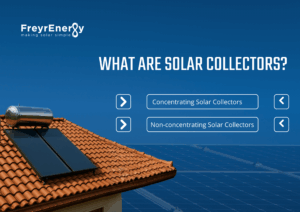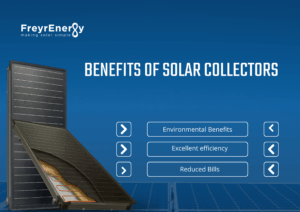Solar energy has proven, time and again, its reliability and its ability to provide clean, green energy to consumers. Components and variants, such as PV panels, are commonly used across residential and commercial complexes.
However, if we dive deeper, the core has many applications beyond generating electricity. This is where things like solar collectors play an important role in delivering the purpose. So the question is, what is a solar collector after all? Let us check it out.
What are Solar Collectors?

Solar collectors are devices designed to absorb direct sunlight and convert it into usable heat energy. Unlike a photovoltaic panel, a solar collector’s whole purpose is to generate heat that can be used in devices like solar water heaters or in solar chimneys. The entire purpose of a solar collector is predominantly to transfer solar radiation and maximize its use as a heating component.
Solar collectors have varying heat efficiencies and are used to heat both air and water across different components.
There are two types of solar collectors available for different use cases, including:
- Concentrating Solar Collectors: These collectors use optical systems with glass reflectors. With this, the heat concentration is spread across a larger area and is diverged into a smaller receiver. This makes for better heat generation.
- Non-concentrating Solar Collectors: A non-concetrating solar collector captures sunlight from a wider surface area and transforms it into usable heat energy. However, the surface area and receiver are considerably larger, which makes the heating a tad less than that of the concentrated solar collector type.
Both these solar collectors have different use cases and design models. Concentrated solar collectors are predominantly used in industrial applications, whilst non-concentrated solar collectors are used for residential purposes.
Apart from these two core types, they allow us to explain the other types of solar collectors that are widely categorized for different use cases.
Sub-Types of Solar Collectors
- Flat Plate Collectors: The most common type of non-concentrating collector is flat plate collectors. These are widely used in residential areas to heat water. A flat plate collector contains an absorber surface that converts solar energy into thermal energy. These are made of copper or aluminium, two metals with high thermal conductivity and minimal energy loss.
- Evacuated Tube Collectors: Evacuated Tube Collectors have earned a reputation as the most efficient type of solar collectors. These setups come with parallel rows of glass tube that has an absorber with an evacuated outer tube. This, in turn, has an excellent heat flow that minimizes heat loss to a reliable degree.
- Line Focus Collectors: Also known as parabolic troughs, these collectors use highly reflective materials to concentrate sunlight. The reflector is a parabolic trough, which concentrates solar radiation along a line. Additionally, the absorber is placed with an absorber coating on the focus to capture the maximum solar energy.
Benefits of Solar Collectors

- Environmental Benefits: Solar collectors help reduce grid power use. This, in turn, helps reduce carbon footprints and the release of greenhouse gases.
- Excellent efficiency: Solar collectors generate thermal energy efficiently to heat air and water. With advancements still underway, it won’t be surprising to see even higher efficiency soon.
- Reduced Bills: With the dependency on grid-based energy getting reduced, residents and even industries could save significant amounts of money in different times on both gas and electricity.
Application for Solar Collectors
Solar collectors have a variety of use cases, making them an innovative product that caters to different consumers. Let us check the most common use cases, including:
- Residential: Residents use solar collectors to heat water and even swimming pools in the residential complexes. These are an excellent alternative to reduce the dependency on LPG and electricity.
- Commercial: Commercial places like hotels and hospitals can benefit from hot water for different use cases. Having a solar collector would reduce monthly power bills significantly.
- Industrial: Heavy industries often require steam and boiling water for different thermal-based utilities. Having a solar collector like a line focus collector does an excellent job in large-scale heat generation.
Conclusion
Solar collectors have made lives easier across all spheres of society. These products have a large shelf life and could well serve for decades for the consumers using it. At Frey Energy, we would love to talk about solar collectors and help you reap the benefits of the same. Visit us at Freyr Energy today.
